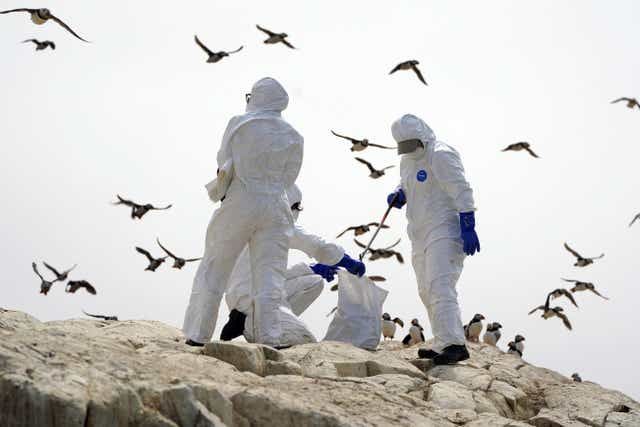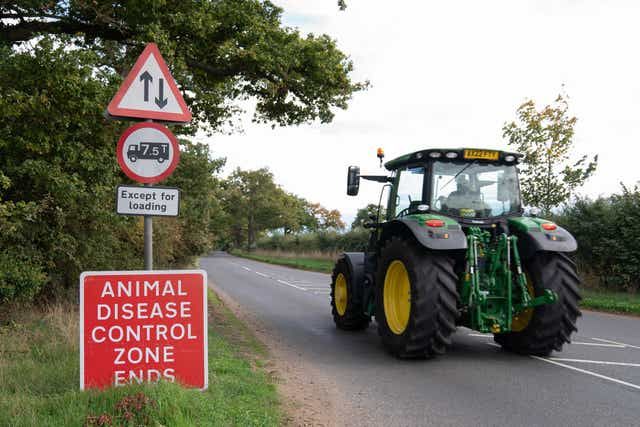
Is Britain ‘sleepwalking’ into a human bird flu pandemic? Why experts are worried
But Levinson and his fellow health professionals have been here before. When a sprinkling of Covid cases were first reported in China in December 2019, it was easy to dismiss those, too. And look at us now: a pandemic and 6.8 million deaths later, still clashing over the cause of the outbreak (was it leaked from a lab in Wuhan or a Chinese wet market?), still fighting about whether it was right to impose a lockdown, still wondering if we should have seen it coming earlier.
Officials say the Cambodian girl, now named as Bean Narong from the southeastern province of Prey Veng, was the first known human infection of the H5N1 strain of bird flu in the country since 2014 — and the eighth globally since the current wave started in October 2021, hitting 76 countries, triggering national emergencies and leading to the worst animal-disease outbreak in US history. According to the World Organisation for Animal Health (WOAH), more than 140 million poultry have died from the virus or been slaughtered to stop it spreading, and humans have tested positive in countries including China, India, Spain, the US and the UK.
Narong, the youngest of four siblings and a so-called star student who wanted to become a doctor, had reportedly fallen ill with a high fever, coughing and throat pain six days before her death. She lived close to a conservation area and experts have since confirmed that the infection came from poultry, though she did not have the widely-circulating variant.
Narong’s father Bou Vorn, 49, also tested positive for the virus but has not as yet displayed any major symptoms, and China has since confirmed two human cases of bird flu in a middle-aged man and woman more than 800 miles apart. Growing numbers of infections have also been reported in mammals, including dolphins, leopards and grizzly bears overseas and at a large mink farm in Spain.
Here in the UK, cases have been reported in foxes and otters as well as birds, with councils in London and other cities now warning the public against feeding birds in parks and the government proposing new rules that those who keep chickens in their gardens will have to register them first.
Professor Neil Ferguson, the man whose modelling was instrumental in the first Covid lockdown, is said to be working on a Covid-style model for a bird flu pandemic following warnings from the World Health Organisation that it poses the biggest pandemic threat to the world after Covid. Officials in London are reportedly drawing up contingency plans in case the problem escalates – so how worried should we be about the virus jumping to humans in the UK? Can it be passed from human-to-human? And should we be preparing for this to escalate into a full-blown pandemic?
Among health experts, the answer seems to be a loud and resounding yes. We should be preparing. Not because a pandemic is likely, but because a low risk doesn’t mean there’s no risk – and even if bird flu doesn’t result in a global pandemic this time, that’s not to say it won’t in the future.
“It’s not a matter of if, but when, we have a flu pandemic,” says Levinson, a London-based GP and medical director at urgent private healthcare service Doctorcall. He’s been watching bird flu closely for 15 years and says a bird flu pandemic isn’t exactly inevitable, but that all the elements are in place: an unprecedented outbreak in a developing country; rising cases in developed countries; a sprinkling of human infections; a lack of human vaccine.
 Does the spread of bird flu to mammals mean a greater risk to humans?
Does the spread of bird flu to mammals mean a greater risk to humans?
Professor Peter Openshaw, a former SAGE advisor who advises the government on new and emerging threats from respiratory viruses, agrees. Just because the world is still experiencing a Covid pandemic, it is no less likely to experience a new pandemic coming from elsewhere. “We absolutely need to watch this one,” he said last month. “The good news at the moment is that there’s no evidence of human-to-human spread. We need to prepare for the worst but obviously hope for the best.”
Dr Quinton Fivelman, chief scientific officer at the London Medical Lab, says part of the problem with bird flu is that the public have got “used to outbreaks on poultry farms” over the last 25 years. But we mustn’t be complacent: the virus is highly contagious – even a gust of wind can carry it via bird dropppings – and can quickly spread around the world via migrating birds. It has a 100 per cent mortality rate in chickens and poultry farmers routinely destroy entire flocks if even a single case is found.
Concerningly, 53 per cent of the 860 known human cases since 2003 have been fatal and experts are warning that the seasonality they used to observe with bird flu “isn’t there anymore”. Gregorio Torres, WOAH’s head of science, says the virus used to be typified by sporadic seasonal outbreaks but many countries where outbreaks are common are now reporting cases throughout the year.
 Thomas Angus, Imperial College London
Thomas Angus, Imperial College London
This latest outbreak — the deadliest on record — has already resulted in tragic outcomes: millions of tame and wild birds have been decimated across the world over the last year, particularly in America, which has seen the worst animal-disease outbreak in US history, with losses of close to 60 million birds and whispered talks about a controversial move to vaccinate all commercial chickens, laying hens, turkeys and ducks (it could trigger trade bans that would crush the country’s export market). In Peru, the disease has killed more than 3,500 South American sea lions – 3 per cent of the animals’ Peruvian population – after it was brought in by pelicans, and whole flocks of swans have died here in the UK.
Since Narong’s death in Cambodia, TV producers even revealed that they had to change filming plans for veteran broadcaster David Attenborough, after fears he’d catch bird flu from wild bird species while shooting his Wild Isles series in and around Britain. Human bird flu symptoms include a very high temperature, aching muscles, a headache and a cough or shortness of breath, and infectious disease experts warned that the 96-year-old would most likely die if he caught it.
So far, all of the known human cases of bird flu are believed to have caught it from birds or dead birds and there is no evidence that this strain has spread between people. One of the Chinese victims had eaten chicken shortly before experiencing symptoms; the other had come into contact with live birds. But “while the evidence suggests that the virus does not pass easily to people, there is an increased chance of people coming into contact with the virus due to the high levels in birds,” says David Heymann, Professor of Infectious Disease Epidemiology at the London School of Hygiene & Tropical Medicine. “So far no strain has emerged that sustains transmission between humans... that would be needed to create a pandemic.”
 Tesco has joined other supermarkets in limiting purchases of eggs amid supply disruption
Tesco has joined other supermarkets in limiting purchases of eggs amid supply disruption
But while WHO’s chief scientist Jeremy Farrar says the threat of human-to-human transmission is “low”, it’s not impossible. That’s what happened with Covid, Levinson points out. “We’re only one mutation away from human-to-human transmission – and that mutation is more likely to happen after it’s got into a person, which it already has,” he says. “Nobody can predict when or where that mutation will happen, but at some point it’s bound to.”
Farrah, one of the world’s leading scientists, agrees. “Imagine, tomorrow morning at nine o’clock there’s a report that there’s 100 people admitted to a hospital somewhere with a nasty respiratory virus, and it happens to be H5N1,” he told a briefing in London last week. “That’s my concern; that we’re in slow motion watching something which may never happen but if it were to happen, would we look back and say, ‘Why didn’t we do more?’... You would hate to look back in the midst of an H5N1 pandemic and say: ‘Hold on, didn’t we watch this avian population die all over the world and we started to see mammals dying and what did we do about it?’”
Farrar says bird flu’s jump to mammals should be a klaxon call for government action. What he and his fellow health experts would like to see governments do is the following: investing in developing vaccines for every strain of flu that exists in animals; stockpiling more antivirals and PPE (and creating manufacturing capacity to ramp this up); improving biosecurity in farms and markets; and encouraging other governments to do the same – particularly those in developing countries, where poultry are more likely to live in close quarters with humans. “It’s very important lots of people don’t catch it,” says Levinson. “When lots of people have it [which is more likely in developing countries], that’s where the virus has the selective advantage. So the key thing is containing it abroad.”
 The case was detected on the Isle of Anglesey, off North Wales
The case was detected on the Isle of Anglesey, off North Wales
Dr Fivelman agrees it is “concerning” there is no human vaccine for bird flu yet, as the higher number of cases means the higher the chances of a mutation. Even if we did have a vaccine and there was an outbreak in Europe, the Middle East, America or Mexico tomorrow, Farrah says it would impossible to vaccinate the world within 2023.
But wouldn’t it be a waste of time and money developing a vaccine, if it never escalates into a pandemic? Absolutely not, says Farrah. “If [a human bird flu outbreak] doesn’t happen, you haven’t lost, because you’ve still got those [vaccines].”
Experts are, slowly, rallying. WHO-affiliated labs already have samples of two flu virus strains that closely resemble the current H5N1 virus, so these could be used by vaccine manufacturers to create a human vaccine. And several producers of seasonal flu vacines, such as GSK, have already started early testing. WHO says having these strains prepared could help to shave two months off vaccine development if it does go ahead, but acting quickly enough would still be a challenge. “We are more prepared (than for COVID),” says WHO’s director of global infectious hazard prepardness, Sylvie Briand. “But even if we are more prepared, we are not yet prepared enough. We need to really continue the efforts for a flu pandemic.”
To its credit, the British Government has made some early steps towards this worst case scenario. The UK Health Security Agency is currently making plans to deploy lateral flow tests that would work for bird flu – they already have some for regular flu, but not the avian strain – and it is also exploring the development of blood tests to detect antibodies against the virus. The agency is also reported to be modelling how many people might become infected and display symptoms, whether lateral flow tests and blood tests would actually be effective, and which genetic mutations might signal an increased risk to human health.
So what can we as members of the public do in the meantime? Levinson’s advice is not to be scared, but to educate and prepare yourself as well as possible. He recommends being wary of handling dead birds in the wild, and saying yes to the regular flu jab if you’re offered it this winter or next, as it is likely that this will “pre-charge the immune system”, preparing the body for what might hit it if it did get infected with bird flu.
His remaining piece of advice is understanding: “that pandemics are things that can happen, that they’re not going to wipe us all out and that we just need to be a bit sensible” – but not overreacting and getting into the “mass panic” many got into at the start of the Covid pandemic.
He hopes that governments won’t let the current economic crisis put them off stockpiling antivirals that might expire if the worst doesn’t happen, and will instead learn from Covid that the worst can happen and preparedness is key. His peer Peter Openshaw put it best himself: let’s prepare for the worst, “but hope for the best.”











